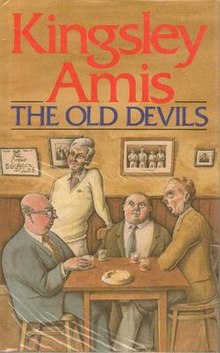The Old Devils: Difference between revisions
m Robot - Moving category Man Booker Prize winning works to Category:Man Booker Prize-winning works per CFD at Wikipedia:Categories for discussion/Log/2014 September 5. |
m ital |
||
| Line 1: | Line 1: | ||
{{Refimprove|date=June 2013}} |
{{Refimprove|date=June 2013}} |
||
[[Image:OldDevils.jpg|thumb|right|First edition cover]] |
[[Image:OldDevils.jpg|thumb|right|First edition cover]] |
||
{{italic title}} |
|||
'''''The Old Devils''''' is a novel by [[Kingsley Amis]], first published in 1986. The novel won the [[Booker Prize]]. It was adapted for television by [[Andrew Davies (screenwriter)|Andrew Davies]] for the [[BBC]] in 1992, starring [[John Stride]], [[Bernard Hepton]], [[James Grout]] and [[Ray Smith (actor)|Ray Smith]] (it was the latter's last screen appearance before his death). |
'''''The Old Devils''''' is a novel by [[Kingsley Amis]], first published in 1986. The novel won the [[Booker Prize]]. It was adapted for television by [[Andrew Davies (screenwriter)|Andrew Davies]] for the [[BBC]] in 1992, starring [[John Stride]], [[Bernard Hepton]], [[James Grout]] and [[Ray Smith (actor)|Ray Smith]] (it was the latter's last screen appearance before his death). |
||
Revision as of 14:09, 4 July 2015
This article needs additional citations for verification. (June 2013) |

The Old Devils is a novel by Kingsley Amis, first published in 1986. The novel won the Booker Prize. It was adapted for television by Andrew Davies for the BBC in 1992, starring John Stride, Bernard Hepton, James Grout and Ray Smith (it was the latter's last screen appearance before his death).
Alun Weaver, a writer of modest celebrity, returns to his native Wales with his wife Rhiannon, sometime girlfriend of Weaver's old acquaintance Peter Thomas. Weaver begins associating with a group of former friends, including Thomas, all of whom have continued to live locally while he was away. While drinking in the house of another acquaintance, Weaver drops dead, leaving the rest of the group to pick up the pieces of their brief reunion.
It is considered by Martin Amis to be his father's masterpiece, writing in his autobiography: "...it stands comparison with any English novel of the century." [1]
References
- ^ Amis, Martin. Experience: A Memoir, 2000, p. 258
